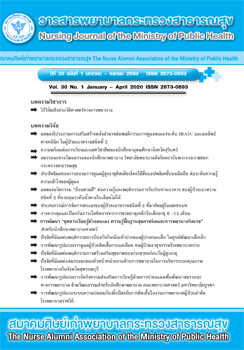Cultural Competency of Nursing Students from Nursing College under The Ministry of Public Health
Main Article Content
Abstract
This research was descriptive research aims to study the cultural competency among nursing students in 3rdyear and 4thyear from nursing college under The Ministry of Public Health. The sample were 345 nurse students, selected by a stratified random sampling across the nursing college under MOPH. Data were collectedusing a self-reported questionnaire to obtain data about personal data, perceived cultural competence, and cultural understanding. While the questionnaire of perceived cultural competence reported its Cronbach’s coefficientalpha of .86, the questionnaire of cultural understanding reported its KR-20 of .73. Data were analyzed usingdescriptive statistic. The finding reveals that nurse students reported a moderate level of culture competence (mean=3.29, SD=.32). Regarding cultural understanding, furthermore, 50.72% of nurse students reported a moderate level of cultural understanding, and 35.94 % of those reported a low level. The findings of this study might be utilized as basic information for teaching, so that the cultural competency of the nursing students could be promoted as congruent with the cultural contexts of patients who come to receive health services from the patients.
Article Details
บทความและรายงานวิจัยในวารสารพยาบาลกระทรวงสาธารณสุข เป็นความคิดเห็นของ ผู้เขียน มิใช่ของคณะผู้จัดทำ และมิใช่ความรับผิดชอบของสมาคมศิษย์เก่าพยาบาลกระทรวงสาธารณสุข ซึ่งสามารถนำไปอ้างอิงได้
References
2. Nursing Council. Ministry of Public Health Minutes of the nursing competency determination Profession that corresponds to the health reform on May 3, 2008. (in Thai).
3. Songwanthana P. Nursing education management in cultural diversity. At the 2008 academic conference,
nursing for life balance in multiculturalism Faculty of Nursing, Prince of Songkla University, on 14-15 August 2008, at the Grand Ballroom, BP Grand Hotel, Hat Yai District, Songkhla Province. (in Thai).
4. Jirarode A. Study of cultural competency of lecturers and students in faculty of nursing, Thammasat University, tujournal, 2015;23(6):1006-22(in Thai).
5. Songwanthana P, Hirunchunha S, Sangchan H, Petpichetchian W, Khampalikit S. (2009). Curriculum development to promote cultural competencies of nursing students Research report, Faculty of Nursing, Prince of Songkla University, Songkhla.2009. (in Thai).
6. Siriphan S, Tohkani D, Tohkani M. Cultural competency of nursing students in three southern border provinces of Thailand, Princess of Naradthiwas University Journal, 2009;1(1):1-11. (in Thai).
7. Siriphan S, Songwanthana P. Teaching methods for enhancing cultural competency of nursing students based
on theoretical concepts of Campinha-Bacote. Princess of Naradthiwas University Journal, 2014,6(1);146-57. (in Thai).
8. Songwatthana P. Nursing research across cultures: research concepts and issues. Thai Journal of Nursing
Council, 2014;29(4):5-21. (in Thai).
9. Campinha-Bacote, J. A model and instrument for addressing cultural competence in health care, J. Nurse.
Education, 1999;38(5):203-7.
10. Suwannaka Y, Sosome B, Chaowaing K. The developmental model for enhancing cultural competences of
nurse instructors and bachelor nursing students, Journal of Nursing 2016;34(4);161-74.
46
11. Office of the Permanent Secretary Ministry of Public Health. Details of the curriculum .Bachelor of
nursing science program course update 2560. Copies of documents. 2018. (in Thai).
12. Mansiri P, Srijakkot J. Cultural competency of nurse administrators and staff nurses in regional hospitals being under the ministry of public health. Journal of Nursing and Health Care 2016;33(2):168-75. (in Thai).

